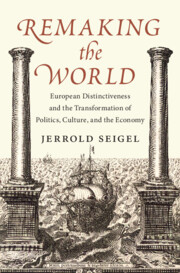 Remaking the World
Remaking the World Book contents
- Remaking the World
- Remaking the World
- Copyright page
- Contents
- Figures
- Acknowledgments
- 1 Introduction
- Part I Liberty and Liberties
- Part II Autonomy and Teleocracy
- 5 Spaces of Autonomy
- 6 Classical Humanism and Aesthetics
- 7 Science as a Sphere of Autonomy
- 8 Teleocratic Sciences
- Part III Openness and Domination
- Part IV Making Industry Modern
- Notes
- Index
8 - Teleocratic Sciences
from Part II - Autonomy and Teleocracy
Published online by Cambridge University Press: 29 November 2024
- Remaking the World
- Remaking the World
- Copyright page
- Contents
- Figures
- Acknowledgments
- 1 Introduction
- Part I Liberty and Liberties
- Part II Autonomy and Teleocracy
- 5 Spaces of Autonomy
- 6 Classical Humanism and Aesthetics
- 7 Science as a Sphere of Autonomy
- 8 Teleocratic Sciences
- Part III Openness and Domination
- Part IV Making Industry Modern
- Notes
- Index
Summary
Committed to the same Aristotelian and Ptolemaic principles as their European counterparts, Arab astronomers produced highly accurate records of celestial motions and sought solutions to the same discrepancies between observation and theory. But none of these involved questioning geocentrism; astronomy was often pursued as an aid to religious observance, giving accurate times for holidays and rituals. Copernicus drew on Islamic writings as on many others, but claims that his heliocentrism in some way depended on them are unacceptable, given their unquestioning geocentrism. In his great work on Chinese science, Joseph Needham showed that it was often superior to Western natural philosophy both empirically and in its understanding of basic natural processes. He attributed its failure to produce a Copernican-Newtonian revolution to various external factors. But the notion that it had such potential rests on the false assumption that its strengths were the ground out of which a science capable of overturning the bases of its own practices might emerge. Such a capacity depends instead on the presence of conditions favorable to rendering the sphere of science autonomous. Only in the nineteenth century, spurred by modern chemistry, biology and physics brought by Western medical missionaries, would Chinese science take this turn.
Keywords
- Type
- Chapter
- Information
- Remaking the WorldEuropean Distinctiveness and the Transformation of Politics, Culture, and the Economy, pp. 160 - 178Publisher: Cambridge University PressPrint publication year: 2024
